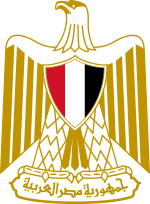| وزارة الثقافة | |
 | |
| Agency overview | |
|---|---|
| Formed | 1952 |
| Preceding agencies |
|
| Jurisdiction | Government of Egypt |
| Headquarters | Zamalek, Cairo 30°3′33″N 31°13′1″E / 30.05917°N 31.21694°E |
| Agency executive |
|
| Website | http://www.moc.gov.eg/ |
The Ministry of Culture of Egypt is a ministry responsible for maintaining and promoting the culture of Egypt.
YouTube Encyclopedic
-
1/5Views:1 117 18345 94624 5447 929 720240 145
-
Let's Go - Egypt
-
Egypt's Lost Identity | How Egypt Became Arab
-
Ancient Egyptian Culture and Its Continuity in Modern Egypt
-
[CLASSIFIED] "Only a Few People On Earth Know About It"
-
Roman Empire and Christianity | World History | Khan Academy
Transcription
History and structure
After Egypt's independence from Britain during the July 1952 Revolution, the new regime established the Ministry of National Guidance in November of that year, giving it wide responsibilities over broadcasting, journalism, press attaches and film censoring, as well as managing tourism, museums, theatre productions, and popular culture.[1][2] It was considered based on the French model, but also shaped by the experiments of various Eastern Bloc countries with centralized production and dissemination of culture.[3] The ministry was renamed by President Gamal Abdel Nasser in 1958 as the Ministry of Culture and National Guidance.[4][2]
During president Anwar Sadat's regime, the ministry was renamed and restructured a number of times. In the first cabinet in October 1970 there was a Ministry of Culture, with Tharwat Okasha, and a separate Ministry for National Guidance with Mohamed Fayek.[5] Within a month the minister of culture was replaced with Badraldin Abughazi, and the Ministry of National Guidance renamed as the Ministry of Information with the same minister.[6] After a further few months in May 1971 Ismail Ghamem replaced Abughazi.[7] In 1979 it was the Ministry of Culture and Information (during Mansour Hassan's tenure).[8]
Under the Mubarak regime it became the Ministry of State for Culture in 1982, with the information portfolio spun off into a separate ministry yet again.[9]
Affiliated agencies
- Supreme Council of Culture
- General Egyptian Book Organisation
- National Library and Archives (Dar al-Kutub)
- General Authority for Cultural Palaces
- Cairo Opera House
- Egyptian Arts Academy
- Department of Applied Arts
- The Fine Arts Sector
- Cultural Development Fund
- The Book and Publishing Commission
Events
The Ministry often sends delegations to participate in events. In 2015, the Ministry participated in events in Doha, Qatar.[10] In November, 2018 the Ministry participated in the second annual Music Festival in Corsica.[11]
Criticism
In January 2001, the Egyptian Ministry of Culture was criticized for withdrawing three novels of homoerotic poetry by the well-known 8th Century classical Arabic poet Abu Nuwas from circulation.[12][13]
Ministers[14]
- Fathi Radwan, June 26, 1958 - October 7, 1958
- Tharwat Okasha, October 7, 1958 - September 27, 1962, and September 10, 1966 - November 18, 1970
- Mohammed Abdul Qader, September 27, 1962 - March 25, 1965
- Suleiman Huzayyin, 1 October 1965 - September 10, 1966
- Badr al-Din Abu Ghazi, November 18, 1970 - May 14, 1971
- Ismail Ghanem, May 14, 1971 - September 19, 1971
- Yusuf Sibai, March 27, 1973 - March 19, 1976
- Gamal Al 'atifi, March 19, 1976 - February 3, 1977
- Abdel Moneim El Sawy, February 3, 1977 - October 5, 1978
- Mansour Hassan, 19 June 1979 - 23 June 1981
- Mohammed Abdel-Hamid Radwan, September 22, 1981 - September 4, 1985
- Ahmed Heikal, September 5, 1985 - October 12, 1987
- Farouk Hosny, October 12, 1987 - January 28, 2011
- Gaber Asfour, January 21, 2011 - February 9, 2011 July 2014 - March 2015
- Mohamed Assawi, February 22, 2011 - March 3, 2011
- Emad Eddin Abu Ghazi, March 7, 2011 - November 20, 2011
- Shaker Abdel Hamid, December 7, 2011 - April 20, 2012
- Saber al-Arab, April 2012 - July 2014
- Abdel Wahed Al-Nabawi, March 2015 - August 2015
- Helmi Al-Namnam, August 2015 - January 2018
- Ines Abdel-Dayem, January 2018[15] — August 2022[16]
- Nevine Al-Kilani, August 2022 —
See also
References
- ^ "Law 270/1952". The Official Gazette. 1952-11-10.
- ^ a b Jessica Winegar (2009). "Culture is the Solution: The Civilizing Mission of Egypt's Culture Palaces" (PDF). Romes. 43 (2).
- ^ Sonali Pahwa; Jessica Winegar (Summer 2012). "Culture, State and Revolution". MERIP. 42 (263).
- ^ "Presidential Decree 692/1957". The Official Gazette. 1958.
- ^ "Presidential Decree 1685/1970". The Official Gazette. 1970.
- ^ "Presidential Decree 1880/1970". The Official Gazette. 1970.
- ^ "Presidential Decree 780/1971". The Official Gazette. 1971.
- ^ "Meet your presidential candidate: Mansour Hassan, the resuscitated". Egypt Independent. 2012-03-12. Retrieved 2022-12-11.
- ^ "Presidential Decree 428/1982". The Official Gazette. 1982.
- ^ "Egyptian Cultural Office in Doha, Qatar". Cultural Affairs and Missions Sector (in Arabic).
- ^ "Egyptian Cultural Office in Paris, France". Cultural Affairs and Missions Sector (in Arabic).
- ^ "Egypt's culture wars The puritans won't give up". The Economist. 13 May 2010. Retrieved 17 September 2018.
- ^ Samia Mehrez (2001). "Take Them Out of the Ballgame Egypt's Cultural Players in Crisis". MERIP. 31.
- ^ "Ministry of Culture |Previous Ministers". www.moc.gov.eg. Retrieved 2023-03-02.
- ^ "Cairo Opera Chairwoman Ines Abdel-Dayem appointed Egypt's new culture minister". Ahram. 14 January 2018. Retrieved 17 September 2018.
- ^ "Profile: Who is Egypt's new Minister of Culture Nevine El Kilany?". EgyptToday. 2022-08-13. Retrieved 2023-03-02.
External links

